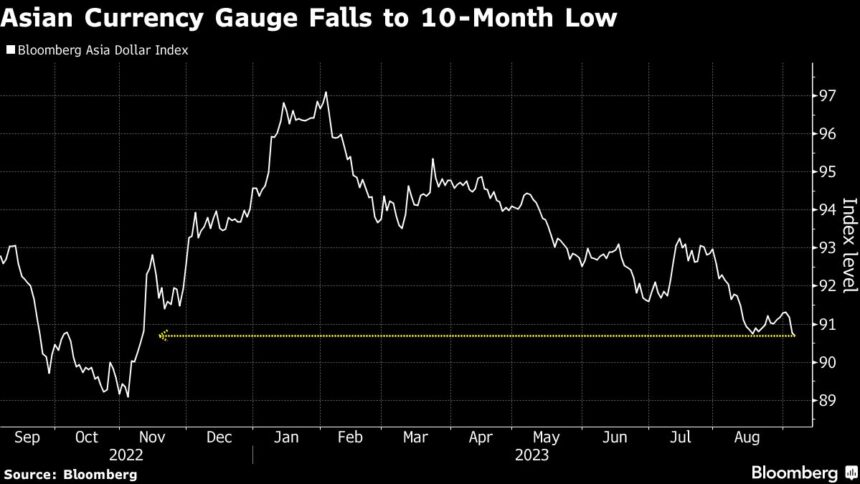(Bloomberg) — The renewed advance in the US dollar is sending Asian currencies to multi-month lows while prompting authorities in Japan and China to step up defense of their beleaguered exchange rates.
Most Read from Bloomberg
Japan issued its strongest warning in weeks against rapid declines in the yen on Wednesday, with its top currency official saying the nation is ready to take action amid speculative moves in the market. Shortly after, China’s central bank offered the most forceful guidance on record with its daily reference rate for the yuan, as the managed currency weakened toward a level unseen since 2007.
Resilient US economic data is persuading some traders that the Federal Reserve will keep interest rates higher for longer, sending the dollar jumping and a gauge of Asian currencies toward the lowest since November. That means policymakers in the region, who spent last year burning through their reserves to support local currencies, are heading back to the battlefield to take on bearish speculators.
“The prospect of higher-for-longer US rates is reigniting pressure, and investors will be cautious,” said Vijay Kannan, a macro strategist at Societe Generale SA in Singapore. “Specifically, EM Asia is more vulnerable to this dollar strength, given a much lower interest-rate differential and a greater exposure to a weaker China growth outlook.”
Elevated oil prices have also reignited fears over higher inflation, a move that’s undermining expectations Asian central banks were done hiking interest rates and hurting the appeal of local-currency bonds. Bonds in Indonesia and Thailand are both seeing foreign outflows this month.
China’s dire economic outlook, which was built on data that have been disappointing for months, is also weighing on sentiment on emerging-market currencies.
The yen and yuan are among the worst performers among Asian currencies this year. While Japan has stopped short of using more aggressive tools to support its currency, China already sought to bolster the yuan by asking state-owned banks to sell dollars while tightening liquidity offshore to squeeze short currency bets.
Similar currency defense measures exist elsewhere in Asia. Taiwan’s foreign exchange reserves declined in August for the first time in nearly a year, as the monetary authority intervened in the market. And in Thailand, the central bank has warned that rapid moves in the baht will prompt intervention.
Still, skepticism remains whether these measures are game changers in the absence of a less hawkish Fed or a pickup in China’s economy. Morgan Stanley turned bearish on emerging market currencies this week, saying those in Asia will be exposed to a China growth slowdown.
“The immediate implication of the soaring US dollar is that it will prevent most Asian central banks from loosening monetary policy, out of fear of aggravating currency weakness,” said Alvin T. Tan, head of emerging-market currency strategy at RBC Capital Markets in Singapore.
–With assistance from Ruth Carson and Neha D’silva.
(Updates with analyst comment)
Most Read from Bloomberg Businessweek
©2023 Bloomberg L.P.








